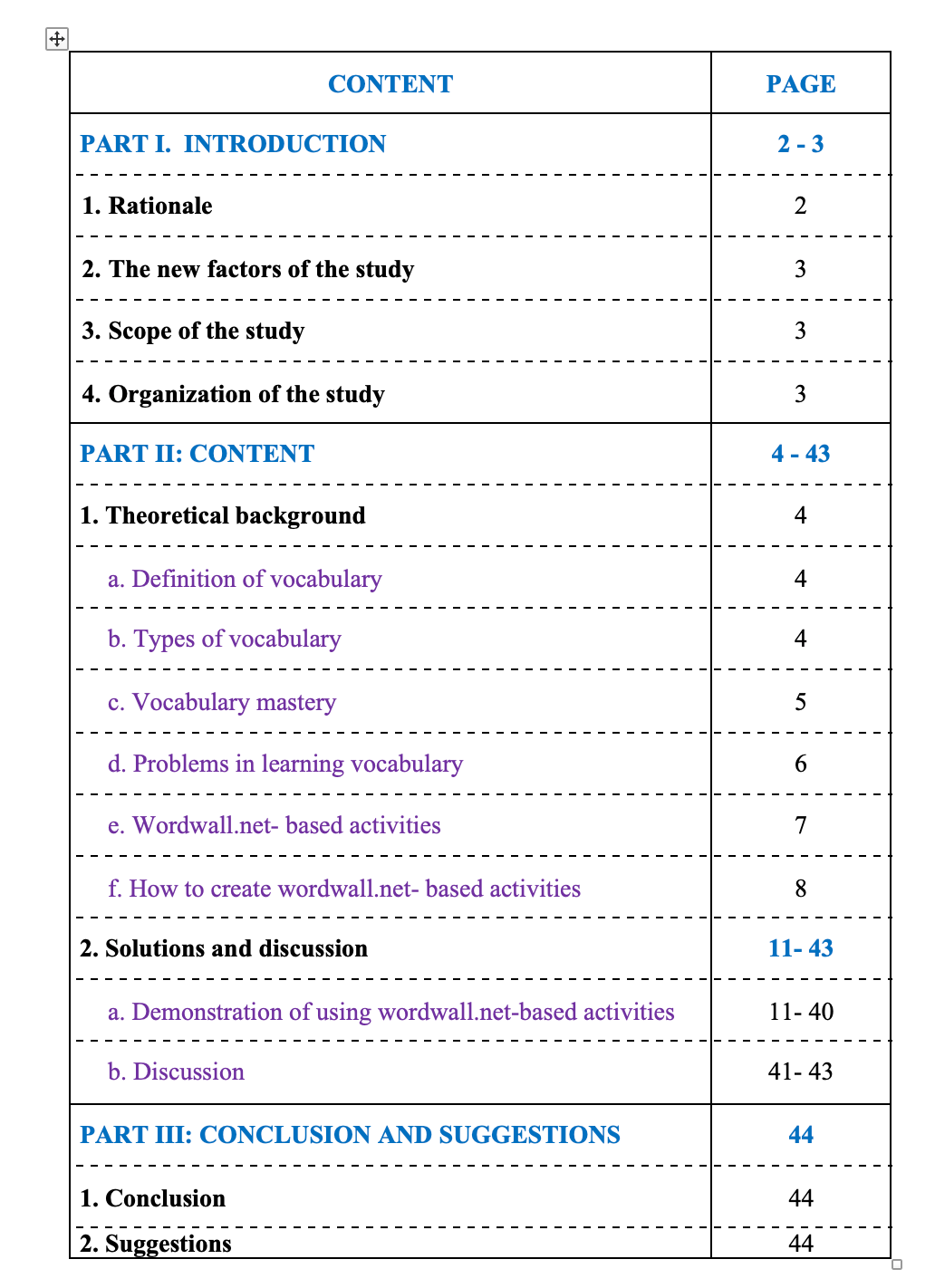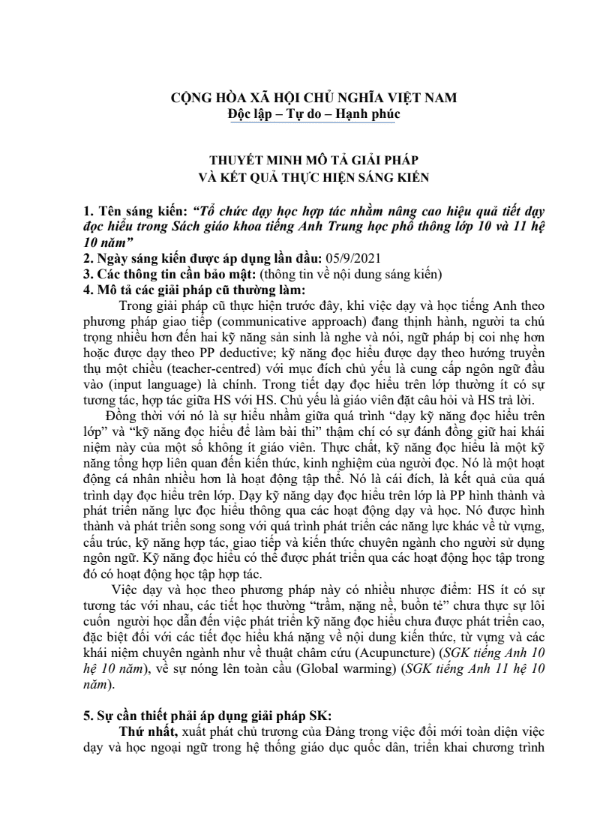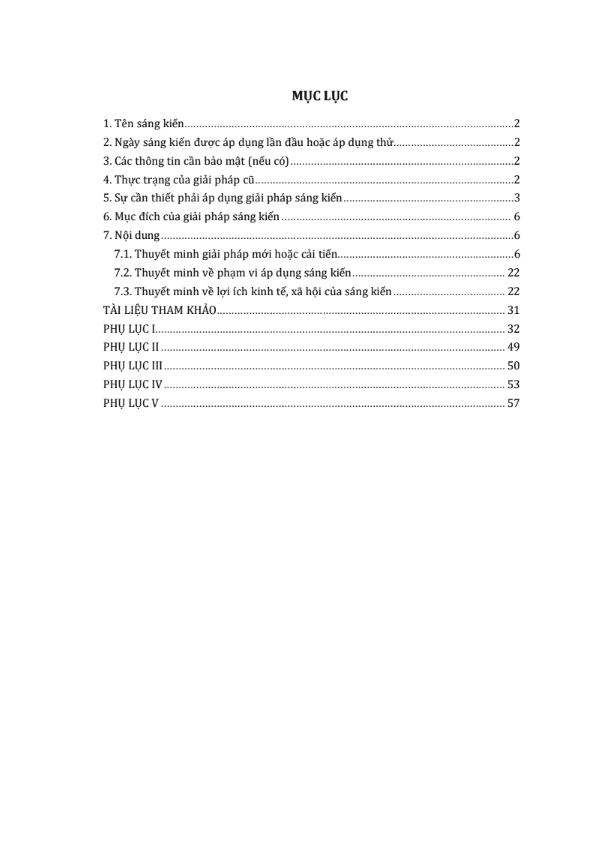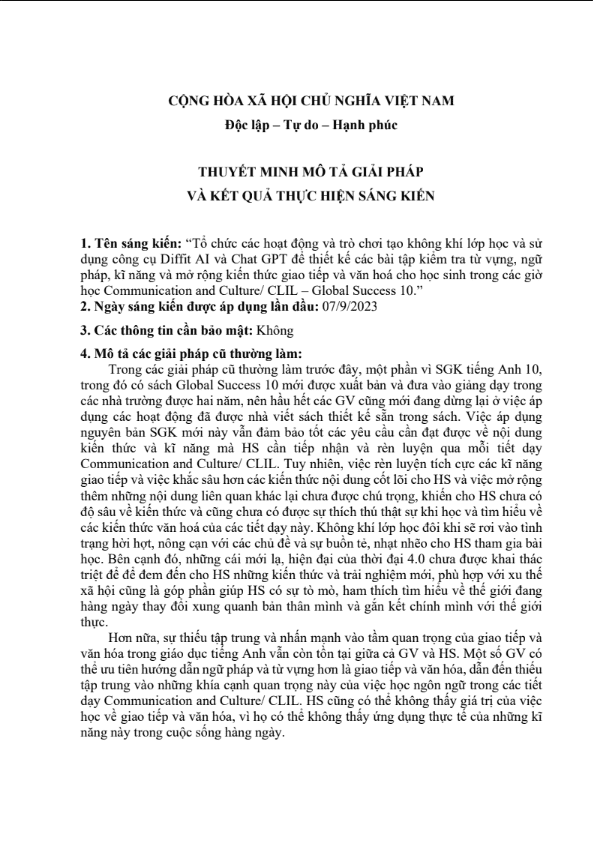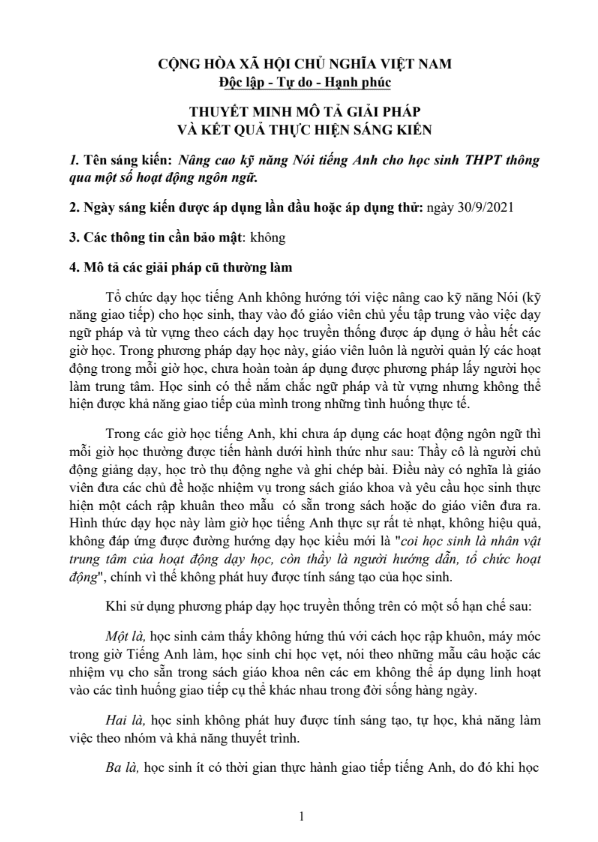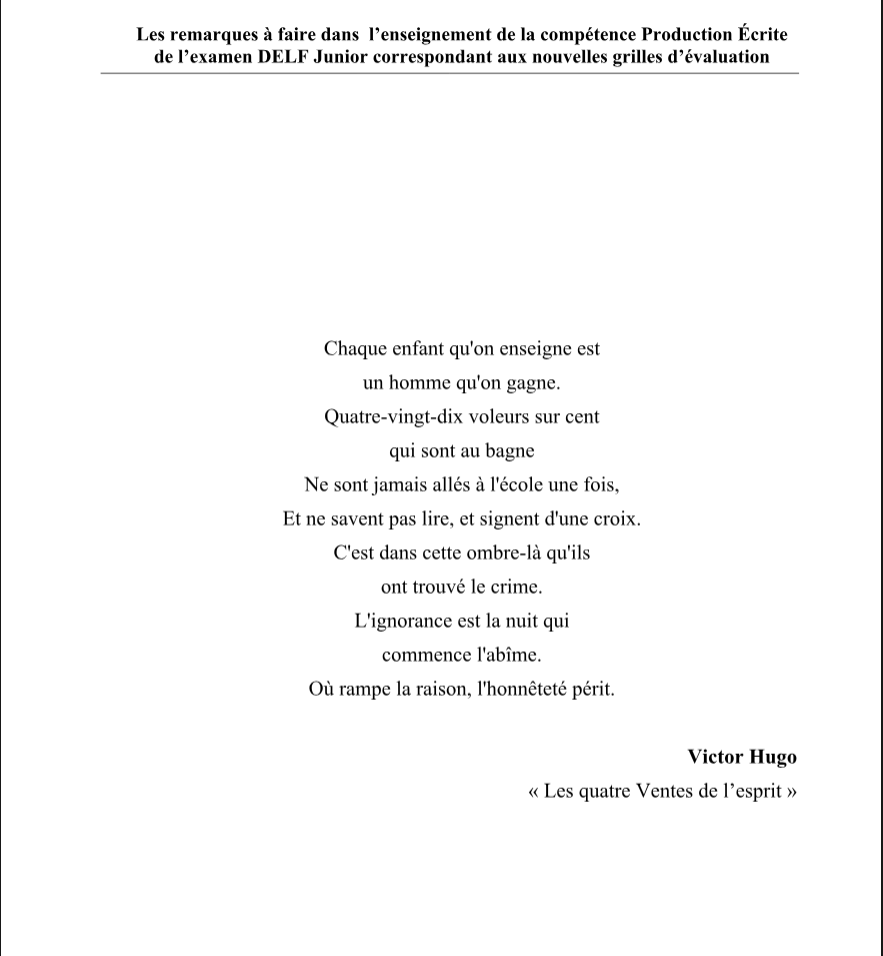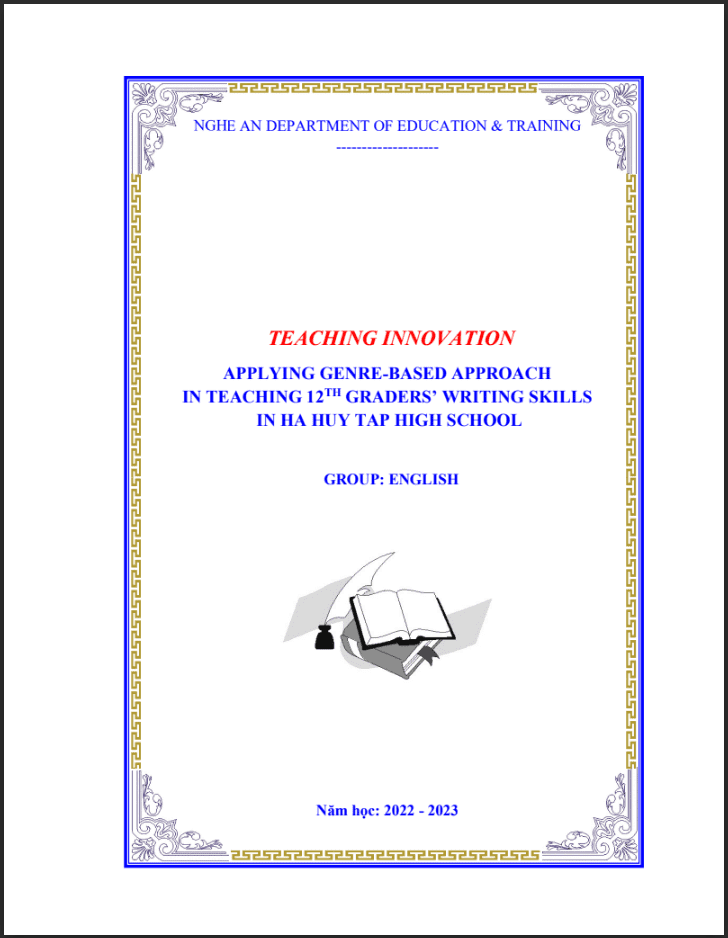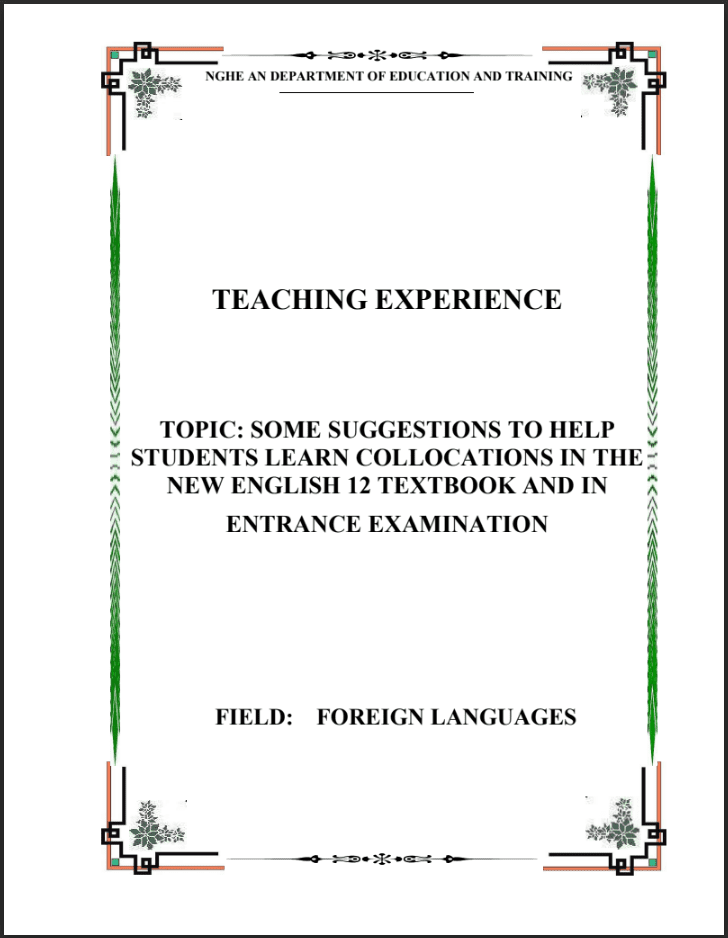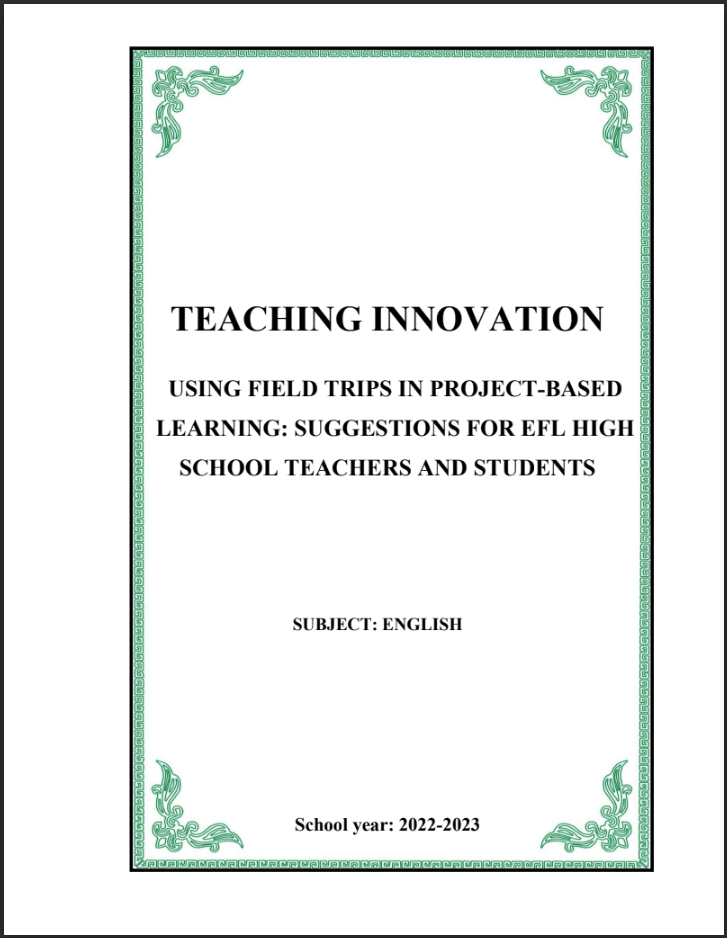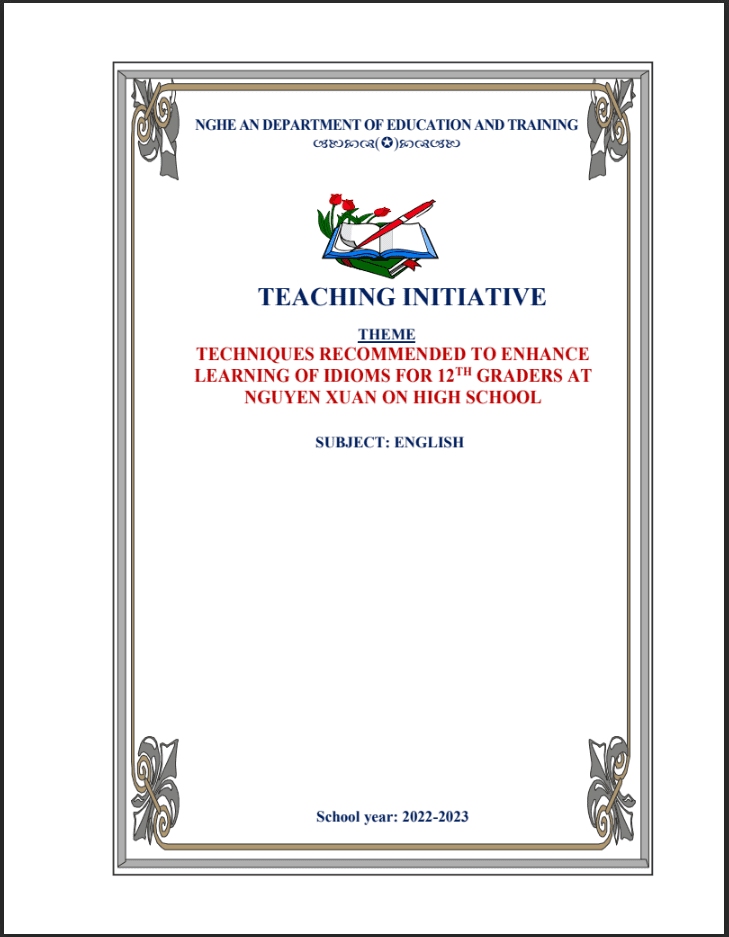SKKN Using Wordwall.net-based activities in teaching vocabulary for EFL students at Quy Hop High school
- Mã tài liệu: MP0026 Copy
| Môn: | Tiếng anh |
| Lớp: | 10 |
| Bộ sách: | |
| Lượt xem: | 690 |
| Lượt tải: | 8 |
| Số trang: | 49 |
| Tác giả: | Lê Thị Thanh |
| Trình độ chuyên môn: | Cử nhân đại học |
| Đơn vị công tác: | THPT Quỳ Hợp |
| Năm viết: | 2021-2022 |
| Số trang: | 49 |
| Tác giả: | Lê Thị Thanh |
| Trình độ chuyên môn: | Cử nhân đại học |
| Đơn vị công tác: | THPT Quỳ Hợp |
| Năm viết: | 2021-2022 |
Sáng kiến kinh nghiệm “SKKN Using Wordwall.net-based activities in teaching vocabulary for EFL students at Quy Hop High school”:
teacher created some activities for students of grade 10 to revise vocabulary. Teacher used the activities such as match up and random card to help students memorize vocabulary related to the topic
Mô tả sản phẩm
| CONTENT | PAGE |
| PART I. INTRODUCTION | 2 – 3 |
| 1. Rationale | 2 |
| 2. The new factors of the study | 3 |
| 3. Scope of the study | 3 |
| 4. Organization of the study | 3 |
| PART II: CONTENT | 4 – 43 |
| 1. Theoretical background | 4 |
| a. Definition of vocabulary | 4 |
| b. Types of vocabulary | 4 |
| c. Vocabulary mastery | 5 |
| d. Problems in learning vocabulary | 6 |
| e. Wordwall.net- based activities | 7 |
| f. How to create wordwall.net- based activities | 8 |
| 2. Solutions and discussion | 11- 43 |
| a. Demonstration of using wordwall.net-based activities | 11- 40 |
| b. Discussion | 41- 43 |
| PART III: CONCLUSION AND SUGGESTIONS | 44 |
| 1. Conclusion | 44 |
| 2. Suggestions | 44 |
PART I. INTRODUCTION
1. Rationale
There is no doubt that vocabulary is generally and widely considered to be one of the most essential elements of a language. It plays an essential role in determining whether or not students will be successful in learning a language and getting their message across. Moreover, it is believed that vocabulary knowledge is vitally important for the four skills, such as listening, reading, speaking, and writing. Our lack of vocabulary knowledge is more likely to result in great trouble in expressing ourselves both in speaking and writing. Because of the significance of vocabulary knowledge in effective communication, vocabulary learning, and instruction are attracting considerable attention from researchers and practitioners, particularly students and teachers.
Since the advent of technology from the beginning of the 21st century, technology and language learning have become terms frequently encountering next to each other, therefore resulting in web-based tools being used in English language classrooms. Many popular web tools, such as Quizlet and Kahoot, are used as experimental tools with learners to investigate to what extent they are effective in enhancing learners’ vocabulary knowledge. There are a lot of research that has been carried out in the area of vocabulary learning strategies in order to determine the effective and most frequently used vocabulary learning strategies. However, there is a lack of research on specific web tools, like Wordwall.net. Hence, the present study aims to evaluate the effectiveness of a single educational game website; Wordwall.net on the vocabulary knowledge of high school students. Wordwall.net is an edutainment website in which there are multiple game choices, all played interactively or individually, such as information matching, picture matching, quiz, wheel of fortune, puzzles, etc. designed for vocabulary practice. On this website, teachers either create their own games out of ready-made templates and add up content (words and images) in the games or they make use of games created by other teachers. Wordwall is particularly beneficial for mixed-level classes because it can also create a dynamic way to have class competitions. For any level of learner, Wordwall has potential to be used for self-study, as you decide which content to use in the activities. You can set tasks for groups or individual learners by giving them an access code. You could even get your learners to use Wordwall to create activities for their classmates.
Moreover, due to the outbreak of Covid -19, most of schools in Vietnam must organize online teaching. Therefore, it is crucial to enhance students’ learning motivation through some special tools and platforms. Basing on the above reasons, I have decided to conduct a study on “Using Wordwall.net-based activities in teaching vocabulary for EFL students at Quy Hop High school”.
2. The new factors of the study
The study suggests many new games for teachers to apply in teaching vocabulary for high school students through wordwall.net platform. Hence, vocabulary memorization becomes more effective for English learners.
The study is expected to research the effectiveness of using interaction with a word wall as the tool to combine the five identified effective teaching strategies plus social interaction to teach vocabulary words to middle school students. Theoretically, this study can be used to enrich the example of techniques in teaching English vocabulary, especially for young learners. Hopefully this study will be helpful and have a contribution for further researches in the field of vocabulary teaching. Practically, this study will give general description about the condition of English vocabulary teaching at high school level. In addition, it will be useful for the teachers who are interested in teaching English for young learners. The result of this study can be used as a consideration to improve the teaching language to young learner, especially for teaching vocabulary online.
3. Scope of the study
This study focuses on the activities of teaching vocabulary based on wordwall platform (dealing with the techniques of presentation, techniques of practice, techniques of training). In this study, I will just focus on the effectiveness on the 10th graders. Hence, the data then will be analyzed through the tests of 10th grade in the school year 2021- 2022.
4. Organization of the study
The study is well organized with 3 main parts: the rationale of the study, the content or the solution of the problems, and the conclusion. Hopefully that the study provides a useful access to most of the teachers in teaching language.
PART II: CONTENT
- Theoretical background
a. Definition of vocabulary
Vocabulary has received a special concern in language teaching, especially teaching English as a foreign language. It can also be regarded as the most frequently important component for language learners since the four language skills; reading, listening, speaking, and writing need a sufficient vocabulary knowledge. The term vocabulary concerns with words and words meaning. It is also defined as a collection all of words in a particular language and has a form in an expression that is associated with meaning.
According to Wikipedia, a vocabulary is a set of familiar words within a person’s language. A vocabulary, usually developed with age, serves as a useful and fundamental tool for communication and acquiring knowledge. Acquiring an extensive vocabulary is one of the largest challenges in learning a second language. Further, vocabulary is the basic of language and there is no language without vocabulary. Before mastering the four language skills; listening, speaking, reading and writing, students have to learn the English components such as vocabulary, structure, and pronunciation.
Words can also be defined in various ways, and estimates of vocabulary size differ depending on the definition used. The most common definition is that of a lemma (the inflected or dictionary form; this includes walk, but not walks, walked or walking). Most of the time lemmas do not include proper nouns (names of people, places, companies, etc.). Another definition often used in research of vocabulary size is that of word family. These are all the words that can be derived from a ground word (e.g., the words effortless, effortlessly, effortful, effortfully are all part of the word family effort). Estimates of vocabulary size range from as high as 200 thousand to as low as 10 thousand, depending on the definition used.
b. Types of vocabulary
There are a variety of ways to categorize vocabulary. However, according to Wikipedia, vocabulary can be divided into their usage in language skills as follow: Reading vocabulary
A person’s reading vocabulary is all the words identified when reading. This class of vocabulary is generally the amplest, as new words are more commonly encountered when reading than when listening.
Listening vocabulary
A person’s listening vocabulary includes the words recognized when listening to speech. Cues such as the speaker’s tone and gestures, the topic of discussion, and the conversation’s social context may convey the meaning of an unknown word.
TÀI LIỆU LIÊN QUAN
- 7
- 105
- 1
- [product_views]
- 5
- 173
- 2
- [product_views]
- 4
- 165
- 3
- [product_views]
- 4
- 129
- 4
- [product_views]
100.000 ₫
- 6
- 434
- 5
- [product_views]
100.000 ₫
- 2
- 507
- 6
- [product_views]
100.000 ₫
- 9
- 546
- 7
- [product_views]
100.000 ₫
- 4
- 409
- 8
- [product_views]
100.000 ₫
- 2
- 595
- 9
- [product_views]
100.000 ₫
- 0
- 538
- 10
- [product_views]

